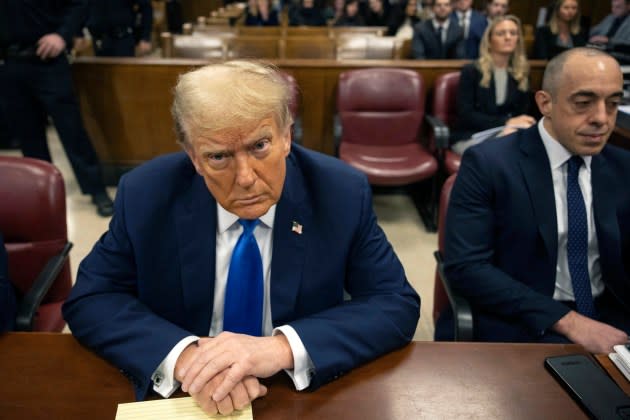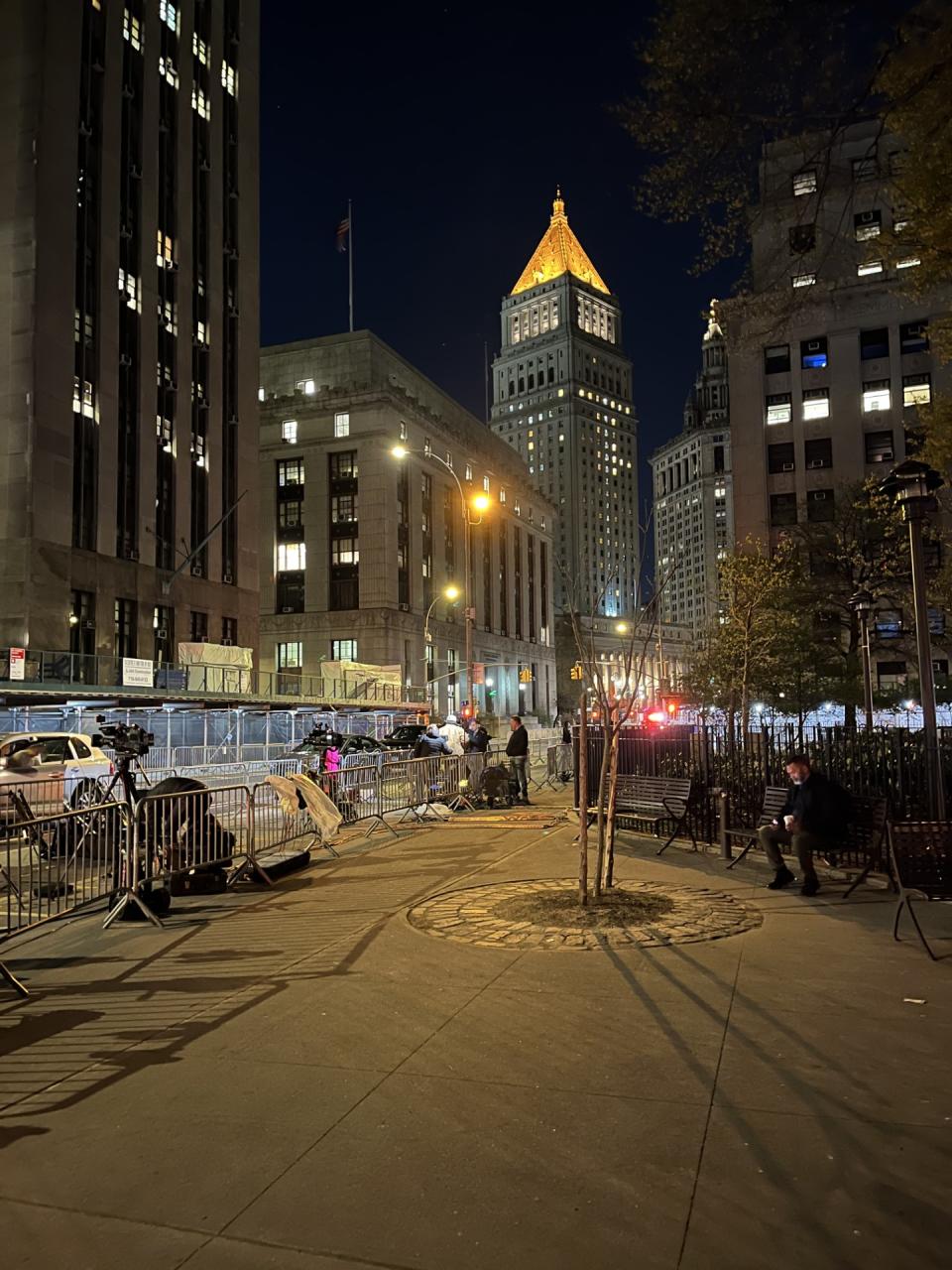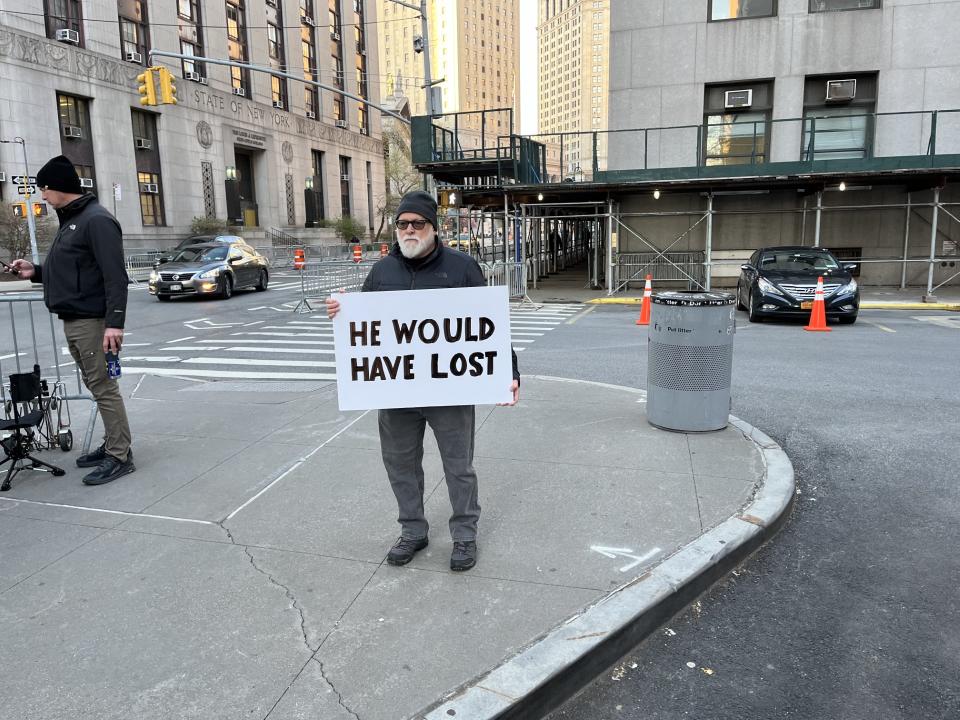David Pecker Takes The Stand In Trump Trial As Prosecutor Outlines National Enquirer “Catch And Kill” Hush Money Scheme — Update

UPDATE: David Pecker, the former CEO of the celebrity magazine and tabloid company American Media, was first witness today, as prosecutors try to show the extent to which Donald Trump sought to suppress embarrassing stories in advance of the 2016 election.
Pecker testified for about 25 minutes, telling the jury about his work publishing Star magazine, National Enquirer and other periodicals before the clock ran out on a court day that was scheduled to end early. He said matter-of-factly that he practiced “checkbook journalism, with budgets of $10,000 per story, sometimes more, for paying sources.
More from Deadline
Pecker will return to the stand on Tuesday after a morning hearing on a request by prosecutors to seek a contempt ruling against Trump for allegedly violating the judge’s gag order in the case.
In opening statements, prosecutor Matthew Colangelo identified Pecker — who is testifying under a subpoena — as “the eyes and ears” in the “catch and kill” strategy to neutralize negative press coverage that was hatched by Trump, lawyer Michael Cohen and Pecker in August 15 during a meeting at Trump Tower in New York, weeks after Trump had announced he was running for president.
The payment to Stormy Daniels was a product of that meeting, Colangelo said, and a direct response to the infamous Access Hollywood tape that surfaced the following year. Colangelo read the text of the tape back to jurors with the crude language that Trump used in the original recording.
Trump sank down into his chair as the prosecutor repeated Trump’s own words about forcing himself on women.
“The campaign went into immediate damage control mode to blunt the impact of the tape,” Colangelo said. One day after the story of the tape broke, Pecker heard from one of his tabloid editors that an adult film actress, Daniels, was claiming to have slept with Trump just months after his wife, Melania Trump, had given birth to their son.
The editor, Dylan Howard, contacted Daniels’ lawyer and Cohen, and Cohen — acting “at Trump’s direction” — negotiated the payment of $130,000 to Daniels to not go public with her story of a sexual encounter with the GOP candidate for president, Colangelo said.
It was a near-repeat of a maneuver used earlier to pay $30,000 to a Trump Tower doorman who was shopping an untrue story of Trump fathering a child out of wedlock, and $150,000 to Karen McDougal, a former Playboy playmate who claimed to have had an affair with Trump, Colangelo said.
Trump urged Cohen to try to stall Daniels until after the election so he wouldn’t have to pay at all, Colangelo said, but Daniels and her lawyer, Keith Davidson — who also represented McDougal — realized they were being “strung along” and demanded payment. Cohen tried to get American Media to pay the hush money but Pecker balked because Trump had yet to reimburse him for the two earlier payments, Colangelo said.
Cohen and a Trump organization accountant, Allen Weisselberg, instead worked out a plan for Cohen to pay Daniels by funneling money from Cohen’s home equity line of credit through a shell company, according to the prosecutor.
The invoices, ledger entries and checks for legal fees that constituted Trump’s reimbursement to Cohen — 34 items in all — are the falsified business documents at the heart of the case, Colangelo said.
A Trump lawyer, Todd Blanche, said in his opening argument, “The 34 counts are really just 34 pieces of paper.” Blanche said that his client merely signed the checks. In each case, he said, “President Trump had nothing to do with the invoice, with the check being generated or with the entry on the ledger.”
Blanche said that he would address his client as “President Trump” throughout the trial “out of respect for the office he held.”
As he prepared to step into the Oval Office, President-elect Trump invited Pecker to his inauguration and later hosted a thank-you dinner for Pecker at the White House, Colangelo said.
Colangelo and Blanche also sought to prepare jurors for the eventual testimony of Cohen, who went to prison after pleading guilty in 2018 to federal charges including campaign finance violations tied to the Daniels payment, as well as separate tax evasion charges. Cohen spent more than a year behind bars.
In March, a federal judge denied Cohen’s request to an early end to court-ordered supervision that was part of his sentence, stating that he may have lied under oath in the case because, as a witness in Trump’s recent New York civil fraud, he effectively recanted his guilty plea to federal tax evasion.
Colangelo said Cohen wants to see Trump held “accountable” for his role in the hush-money scheme and that his testimony will be backed up by phone logs and business documents and other witnesses.
Blanche — in a counter-argument that drew objections from prosecutors — said that Cohen is a confessed liar who blames Trump for all of his ills, including his disbarment.
Blanche spoke of Cohen’s “obsession with President Trump and his desire to see President Trump go to jail in this case,” and his post-prison life as an anti-Trump podcaster, author and critic of the former president.
“His entire financial livelihood depends on President Trump’s destruction,” Blanche said.
PREVIOUSLY: Donald Trump’s attorney said that his client was “innocent” and that the former president “did not commit any crime.”
“The Manhattan District Attorney’s office should never have brought this case,” attorney Todd Blanche told jurors in the defense’s opening statement in Trump’s trial related to hush money payments to former porn actress Stormy Daniels.
Blanche also picked up on prosecutors’ argument that the hush money payments were part of an effort to influence the 2016 election.
“There is nothing wrong with trying to influence an election; it’s called democracy,” Blanche said.
He said that “entering into a non-disclosure agreement is perfectly legal.”
He emphasized that it was Michael Cohen, Trump’s former attorney, who made the payments, in order to persuade Daniels “to not publicly spread false claims.”
Trump paid Cohen $35,000 a month for 11 months, totaling $420,000. Blanche argued that the checks were not to disguise the reimbursement to Cohen for his $130,000 payment to Daniels. Rather, Blanche said, they were made because Cohen was Trump’s personal attorney.
“Ask yourself why would a frugal businessman, a man who pinches pennies, repay $130,000 to the tune of $420,000?” Blanche said.
Earlier, prosecutor Matthew Colangelo said that the inflated payment showed “just how important it was” to Trump “to hide the true nature of Mr. Cohen’s payments to Ms. Daniels.”
PREVIOUSLY: A New York prosecutor told jurors that Donald Trump’s hush money trial was “about a criminal conspiracy and a cover up,” part of an effort to influence the outcome of the 2016 presidential election.
Assistant District Attorney Matthew Colangelo’s opening statement sought to elevate the criminal charges against Trump as no mere white-collar misdeed, but something that had an impact on the direction of the country.
“No politician wants bad press, but the evidence at trial will show that this was not spin or communication strategy. This was a planned, coordinated ongoing conspiracy to influence the 2016 election,” Colangelo said.
Colangelo also read a transcript from the hot mic audio of the infamous Access Hollywood tape, telling jurors that Trump’s “grab ’em by the pussy” comments set off a crisis in his presidential campaign. The day after the tape was released, the campaign was made aware of Daniels’ allegations. That set off an effort to try to buy her silence.
More to come.
PREVIOUSLY: Donald Trump arrived at a Manhattan courthouse this morning, where he will sit and watch as prosecutors and defense attorneys deliver opening statements to a jury in an unprecedented scene.
This is the first criminal trial of a former president, readily apparent with the metal barricades and patrol by dozens of uniformed officers around the courthouse. During jury selection last week, there were scattered street demonstrations and one horrific act of suicidal protest that was seemingly directed at random political and economic forces.
Dozens of reporters and a smaller group of spectators had to pass through two layers of security screening and metal detectors — in the lobby, and again on the 15th floor.
On the upper floor, shortly before 9:30 a.m., the crowd chatting and sorting themselves into two lines suddenly fell silent: down the hall, Trump had just arrived, and stopped to address the pool reporters stationed outside the courtroom.
Trump called the trial a “witch hunt,” while repeating previous claims that the legal proceedings are being orchestrated by the Biden administration. As this is a state case, there is no evidence that the president directed his rival’s prosecution.
Trump also groused about the status of a civil judgment against him, his attorneys argue in a separate proceeding today that a $175 million bond is sufficient collateral on a $464 million judgment against him. That bond is required as Trump appeals the judgment.
“It’s a very very sad day in America, I can tell you that,” Trump said.
Hours earlier, a handful of television reporters stationed outside the courthouse delivered early stand-ups in front of camera lights against a nighttime backdrop of partially lit buildings in lower Manhattan. Professional line-sitters hired by news organizations said they arrived at 10 p.m. Sunday to hold places for reporters not already on a list of reserved seats either in the 15th-floor courtroom where the trial is taking place or a nearby overflow room with a video feed of the proceedings.
TV and audio coverage is restricted in the courtroom, leaving networks to rely on their reporters to give regular updates. Some broadcast networks planned special reports, adding to coverage throughout the day on cable news channels. With the absence of cameras, CNN planned a live text feed of the proceedings on one side of the screen.
Inside the courthouse last week, lawyers sparred over motions and evidence, and would-be jurors aired a variety of opinions, not all of them negative, about Trump as he looked on. More than half of the nearly 200 Manhattanites who passed through Judge Juan Merchan’s courtroom last week said they could not set aside their feelings about the former president to judge him fairly and impartially. They were quickly excused.
A handful were let go after defense lawyers found social media posts under their names that mocked or criticized Trump. The exits underlined the challenge of seating 12 jurors and 6 alternates acceptable to all parties, since, as one excused juror told reporters, “We all have prior opinions about the defendant.”

In a case shorthanded as the “hush money trial,” Trump faces 34 counts of falsifying business records in order to conceal payments to the adult film performer Stormy Daniels ahead of the 2016 presidential election in order to buy her silence about an alleged affair with Trump. That allegedly was part of an ongoing “catch and kill” operation to “identify, purchase, and bury negative information” about the 2016 Republican presidential nominee “and boost his electoral prospects,” according to a statement of facts that the Manhattan District Attorney, Alvin Bragg, submitted alongside the indictment handed down by a grand jury last April.
Prosecutors said that at Trump’s direction, his longtime lawyer and fixer Michael Cohen wired $130,000 to Daniels to stay quiet. “This payment was illegal,” prosecutors said. Trump then reimbursed Cohen, claiming the expense as a legal retainer fee, prosecutors said, describing a “scheme” that broke state business laws and violated election laws.
Prosecutors are expected to call Cohen as a witness, noting that he has already pleaded guilty in a federal case tied to the same secret payment and served time in prison.
Trump has previously denied having an affair with Daniels or being aware of the payment Cohen made to her. He has used his arrivals and departures from the courtroom to criticize the case as a political “witch hunt” and rail at the judge to reporters and cameras stationed in the hallway. Pool reporters last week also keyed on Trump’s behavior inside the courtroom, where he appeared to nod off more than once, and was heard muttering something in the direction of one potential juror — a reaction that drew a swift rebuke from the judge.
After opening statements, prosecutors have lined up a key participant in the long-running catch and kill operation, former tabloid news executive David Pecker, as their first witness, The New York Times reported. As then-CEO of American Media, Pecker, a Trump supporter, published stories in the National Enquirer lauding Trump in the run-up to the election. According to prosecutors, Pecker buried the more unsavory stories including a former Playboy magazines playmate’s tale of an affair with the real estate businessman and reality show star turned political figure.

Judge Merchan has ruled that prosecutors can tell jurors some details about the former president’s conduct toward women, but he’s also set limits on how much.
Jury selection proceeded with little of the carnival atmosphere outside the courthouse that Trump’s first court appearance last April generated. Pro- and anti-Trump protestors have been far fewer in number this time. But media coverage of the case remains intense. On Friday, a Florida man set himself on fire in the park across from the courthouse set aside for demonstrations, in view of a row of television crews.
Ted Johnson contributed to this report.
Best of Deadline
Step & Repeat Gallery: The Best Red Carpet & Party Photos Of 2024
Hollywood & Media Deaths In 2024: Photo Gallery & Obituaries
2024-25 Awards Season Calendar - Dates For Oscars, Tonys, Guilds, BAFTAs, Spirits & More
Sign up for Deadline's Newsletter. For the latest news, follow us on Facebook, Twitter, and Instagram.


